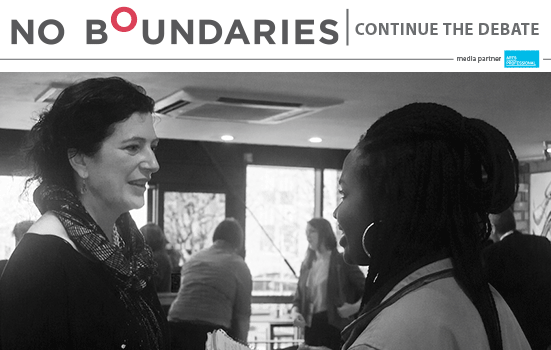
Emma Morsi interviewing Susanna Eastburn, the Chief Executive of Sound and Music
Photo: Lauren Phillips
A fresh perspective
Jess Hoare introduces two of the young journalists who have been responding to the No Boundaries conference.
Together with digital communications teams from Arts Council England and the British Council, No Boundaries is working with a team of young journalists and photographers. The aim has been not only to develop the participants’ understanding of the challenges facing the cultural sector, but also to provide a space for them to examine the questions being raised at the conference. It’s not about finding an answer, but about creating a space in which everyone can ask questions about how we work with young people.
We collaborate with young people in order to learn from them and to promote their individual voices
Working with young people should be a conversation, and in my role as a coordinator I felt it was important to let the participants lead that conversation. We discussed how arts organisations can create opportunities that have meaning and what form that might take. Arts organisations understand young people as stakeholders and often talk in terms of cultural capital and engagement, but we should take care not to fall victim to these terms, and their potential to define and reinforce boundaries. At Watershed, we collaborate with young people in order to learn from them and to promote their individual voices.
Working with the team of vibrant and informed young journalists and photographers at No Boundaries has taught me that the models we use to invite young people to participate and how that invitation is posed is ground for constant agitation. And who better to agitate than young people themselves?
With that in mind, I’m really pleased to be able to hand the discussion over to them.
Emma Morsi
We need to create substantial opportunities that enable a lifelong journey in creativity and culture, beginning from a young age. It’s up to us to establish a need for the arts within our communities.
This shouldn’t be an environment in which people with an interest in the arts thrive, while those who are more logical in their learning are pushed aside. We’d only be creating another system like the one we currently have. We need to create a platform where even those who find it a challenge to creatively interact with learning are encouraged to develop their potential further. We need to understand that we need to be uncomfortable.
Director Judy Kelly put forward the necessity that “if it’s a taboo in the cultural sector we should get straight into it” and be conscious that “history is run by people who have the power”. But to that I say, instead of focusing on shifting this ideology, why don’t we, the arts community, strive to be a weapon of influence? A positive force to be reckoned with in society, from diverse partnerships between organisations to academic influence. That is what we need to become.
Sophie Setter Jerrome
“People don’t value content, they value the social context of how it makes them feel.” This was a pretty provocative line from Nicholas Lovell’s speech on how we can make money from our ‘free’ online content, and why charging fixed rates for our work online isn’t the way forward.
Lovell proposed that we do not inherently deserve to be paid for what we do. Instead we should rely on the “super-fans” of our content to finance us, and accept that unless our audience decides after using our work that we are worthy, they don’t have any obligation to pay us.
Despite the common consensus that artists can exist on lent-out sofas and sheer angst alone, they do actually have bills to pay and a body to feed. So why should people be allowed to regularly consume your content for free just because it doesn’t resonate deeply with their soul?
There are a lot of things that people don’t value! When was the last time someone sat down with you and professed deep love and admiration for the people who sweep the streets, collect the bins or serve them at checkouts? The truth is we see a lot of workers as disposable. But that doesn’t mean we can just collectively decide not to pay them and expect them to keep doing their job in the hope that someone will eventually give them a fiver.
We’ve reached a point where most young people – at least the ones I know – are actively surprised when they’re offered payment for their (often considerable!) contributions to projects, as they’re so used to being wheeled in to do some admin and provide a ‘youth voice’ that earns a company an audience and an education at no expense. We can’t keep telling teens and young adults that they and their creations have no worth, and then expect them to carry on merrily with the work we rely on them to produce.
Here’s a creative idea: pay people when you take their work, pay people when they pledge their time to something you want from them, and pay people when they contribute to society if you want them to keep doing it.
Jess Hoare is Projects Coordinator at Watershed.
www.watershed.co.uk
Emma Morsi and Sophie Setter Jerome are members of the No Boundaries’ team of young journalists.
The young journalist’s provocative articles can be read in full on the No Boundaries website.
Join the Discussion
You must be logged in to post a comment.